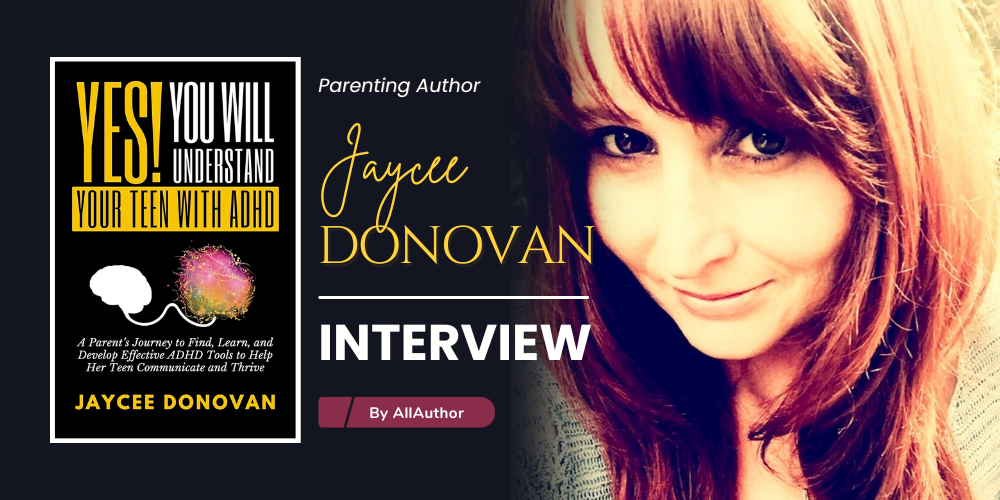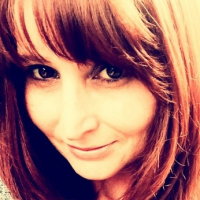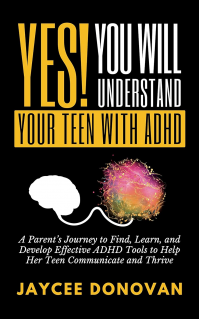Jaycee Donovan Interview Published on: 04, Oct 2023
 Can you share your personal journey and how it led you to become an advocate for teens with late-onset ADHD?
Can you share your personal journey and how it led you to become an advocate for teens with late-onset ADHD?
My daughter started to show signs of ADHD when she was 12 years old. Until this time, she did not experience any of the symptoms typically associated with ADHD. She had never exhibited signs of restlessness, inability to focus, or a lack of control in the classroom at school. She was a mostly happy child. She was barely depressed or anxious. But in an instant, she became a new person. Somebody I did not recognize. She could only sit still for 10 minutes at a time at school. She could not sit still at home. She would bounce a ball for hours a day. She suffered from extreme insomnia as she could not relax. When I brought up these behavior concerns with her pediatrician, the doctor told me that if she had ADHD, she would have exhibited these symptoms all throughout childhood. She recommended that I give her coffee in the morning before school, and this should help her remain focused and alert during the day,
It was an overwhelming, frustrating, and scary time. I felt like I had no support system, and as a parent, I did not know where to get help. Having gone through this and now having a collection of resources to combat the challenges of ADHD, I was inspired to share this knowledge with other parents and children dealing with this complex illness.
What challenges did you and your child face when they were diagnosed with late-onset ADHD at the age of 13, and how did you navigate them?In the beginning, while the symptoms of my teen’s illness were apparent, I did not associate them all with ADHD which made diagnosis difficult. I had always associated restlessness and an inability to focus with ADHD, however my daughter’s symptoms were much broader in scope. For example, aside from her inability to stay seated in a classroom or focus while doing homework, she also has severe issues with her working memory. She cannot make connections between what she learns at a prior point in time because she simply cannot remember. In addition, she cannot turn off the thoughts in her brain which make sleep impossible at times. She would stay awake all night long and go to school extremely sleep deprived. She would turn to dangerous behaviors to self-soothe. Finding the right professionals, mainly a therapist and a psychiatrist that specializes in ADHD, was paramount to understanding the disease and getting treatment.
What was your first piece of writing about?Writing is my preferred form of communication, so that is a plus. I have been writing my entire life. My first written piece was a short story about a person who was unable to stay awake and spent most of his life in a dream-like state. His perception of reality was idealistic yet also painful because it was not how life usually is, and he recognized this. We often use the phrase “that would be my dream” in a positive context. Be careful what you wish for.
Can you tell us about your personal journey as a mother of four children and how it inspired you to write your first book, "YES! YOU WILL UNDERSTAND YOUR TEEN WITH ADHD"?I am so lucky and fortunate to be the mother of four children who are so unique and interesting. There is chaos and confusion and so much irony. But it is incredibly entertaining, and I always look for the humor when it’s there. Life is hard and difficult, and we need to laugh if we can. I often observe my children and their thought processes, as each one of them has such a different viewpoint. They also all have different challenges in their lives. And for one of my wonderful children, overcoming the complexities of living a life with ADHD is such a journey. I am incredibly proud of her ability to face challenges and she never gives up. She is my inspiration for this book.
Your first book is a heartfelt self-help guide for parents dealing with teens diagnosed with ADHD. What motivated you to share your experiences and insights with other parents facing similar challenges?My teen with ADHD had such a complicated diagnosis, and I had a hard time finding where to get help. I did not know where to go to get help, nor did I realize that there is such a big support system for teens living with ADHD. I felt isolated when I watched my daughter’s life fall apart. When she was begging for help, I did not know who to contact first. ADHD took over her life. I would never want a parent dealing with a child with ADHD to feel as alone as a parent as I once did, and my experience motivated me to help other parents and children dealing with such a complex illness.
In your teaching career, you've worked specifically with students diagnosed with ADHD. How has this hands-on experience influenced your approach to addressing the needs of these students in the classroom?I have a history of working in the classroom with students that deal with ADHD and have extensive knowledge of how these students learn best and the challenges they often face. It is imperative that teachers in the classroom are aware of the obstacles these children face every single day, and that just because an accommodation works one day, does not mean it will work the next. There must be a bucket of tools and resources. Now that I have a child with ADHD, I have an even better understanding of how extensive the list of ADHD symptoms can be, and how these children deal with so much anxiety and depression not just in the classroom. Things can be difficult, and life can seem so overwhelming. It is important that educators acknowledge this.
Your second book, "HELLO MISS LAVENDER," is a children's book about a child living with Type 1 Diabetes. Given your personal experience with this condition, can you share the importance of providing young children with stories that address childhood illnesses like diabetes?Like my daughter’s diagnosis with ADHD, it was also challenging to get a diagnosis for my childhood illness which was scary. My parents were told that those with Type 1 Diabetes get the disease if the disease is prevalent in the family, which is not always the case. I did not have Diabetes in my family, so it took a while for us to get a diagnosis. Even worse, once we did have the diagnosis, we did not understand what it meant, how drastically my life would change, and how overwhelming the treatment felt initially. Childhood illness is so scary because things change in an instant. Stories that discuss illness and why a child with that illness is unique are so important because knowledge develops empathy. And having a friend with empathy is a treatment in and of itself.
"HELLO MISS LAVENDER" explores the theme of uniqueness and understanding. How do you hope your book will resonate with children and their families who are dealing with similar health challenges?When I was diagnosed as a child with Type 1 Diabetes, I felt different. I did not know anyone with the illness, nor did I know anyone who exactly understood the disease. I was ashamed that I had an illness that nobody understood. A children’s book that discusses that we all have challenges, and that we are all different from one another, which is ok, will certainly resonate with all children and parents. Many children feel that they don’t fit in for one reason or another, and it is important that they realize they are not alone in this.
Writing a self-help book and a children's book are two very different genres. Can you discuss the differences in your writing process for each book?Both of my books deal with childhood illnesses and the challenges that arise. Also, both of my books implicate how overwhelming it is to deal with the change that accompanies a diagnosis. With my self-help book, my goal was to discuss in detail my experience and to direct those in a similar predicament on where to go for help. I wanted parents to see that there is an ADHD support team that exists and that can help address the daily frustrations. In addition, there was a lot of research that went into this book. There were other situations slightly different than my daughter’s, and I wanted to make sure to include those as well. With “Hello Miss Lavender”, my goal was to write in a context that young children could understand and use a fictional story to detail my experience. It was important for me to relay information so that children understood the message while also learning about Diabetes.
How do you believe reading and literature can play a role in helping children cope with difficult situations and expand their understanding of the world around them?Reading and literature help children understand the world around them through characters that are relatable or may be different but have an interesting story to tell. A book can paint a picture visually, either through pictures or words, which has a greater impact on the mind of a child. A child going through a difficult situation will benefit from a book that discusses how they can overcome the struggle or, at the very least, understand that there are others going through the same struggle.
How do you approach character development in your novels? Are any of your characters inspired by real people or experiences from your own life?“Hello Miss Lavender” is about the relationship between a child, Lavender, and her best friend, Lilly, who was not only just someone she had fun with, but also supported her during her initial diagnosis of Diabetes. As a child, I also had a “Lilly” as a friend. I wanted to approach the development of Lavender by showing that her emotions were real but also relatable. It was also important to me that Lavender learn and grow from the observations she made of how other people are unique, and that she is not the only one that is different.
How do you balance innovation and originality with the expectations and preferences of your audience?There is a balance between my innovation and originality with the expectations of my audience, achieved through descriptive “heart-felt” storytelling. My words are both inspirational, yet my experience is real. My audience is looking for a book that keeps them reading and provides information, whether it is self-help or a children’s story, and I am able to accomplish this, whether it is through my extensive detailing or through developing emotional themes.
Can you share any future writing projects or goals you have in mind, and how your personal experiences will continue to influence your work as an author?In the future, I would like to continue to discuss Lavender’s journey with Type 1 Diabetes as “Hello Miss Lavender” just discussed the definition of Diabetes and what that means. There are a lot of facets to Diabetes that may be confusing to children, and I would love to discuss how Lavender deals with some of those issues as well. There is not a cure for Type 1 Diabetes, and the illness is complex. Breaking down these complexities of what a child with this illness handles daily is worthy of future stories about Lavender. My personal experiences will always dictate my writing. My writing will always be on a subject that I am interested in or know something about. Simultaneously, whether it is with because of an ADHD support team, or a best friend named Lilly, my books will always discuss the importance of both having somebody in your corner and how to be that person to somebody else.
How many plot ideas are just waiting to be written? Can you tell us about one?A writing project that has been put on the back burner for now, but is waiting to be written, is a collection of stories that is based on the chaos of raising my four children in a somewhat unstructured household with a lot of determination yet a lot of hilarious lunacy. My imperfect life is imperfectly funny, and I would love to share this humor with others. It is heartfelt with emotion yet deeply entertaining.
Finally, how has your time with AllAuthor impacted your life and your writing so far? What other measures could be taken on this site to cater better to the needs of the authors?My experience with AllAuthor has been great as it has introduced me to other writers with both similar interests as well as new topics that I didn’t know much about. As in any forum, it is really who you know that can have an impact on your success, and AllAuthor has helped increase the number of writers that I know. I really enjoy reading tips from other writers, and love to hear from writers that are new to publication and show that if you want it, it can happen. It would be great to learn about authors that are local to me, as writing clubs and places to share your writing in person is always beneficial.
Share Jaycee Donovan's interview
Jaycee Donovan is a dedicated teacher hailing from the sunny state of California. Beyond her professional career, she proudly wears the badge of motherhood, raising four wonderful children, each with their unique journeys in life. She is a steadfast advocate for the idea that there exists a network of support systems, resources, and strategies to help teens overcome the challenges posed by ADHD. Through her work, Jaycee strives to ensure that no one feels isolated in their journey to conquer ADHD, offering hope, guidance, and understanding every step of the way.


